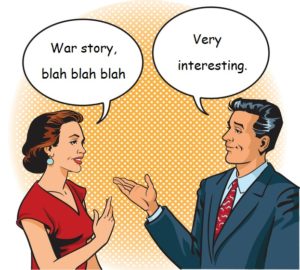


Revealing Client Information
When is it OK to tell tales? Our good friend and colleague, attorney Karen Rubin, has advice for both lawyers and non-lawyers:
Holiday parties are great times to socialize and network with colleagues. But the casual atmosphere and the sometimes-plentiful adult beverages can also tempt you to tell war stories that reveal too much about your past clients, potentially violating your continuing duty of confidentiality under Model Rule 1.9. But what’s “too much”? If something about a previous case or transaction you were involved in is in the news, or is contained in court pleadings, can you discuss it?
The simple answer is “Not really.” Model Rule 1.9(c)(2) says that you have the same duty not to reveal information relating to the representation of your former client as you do to a current client. That’s a very broad duty: it extends to all information “relating to the representation” (i.e., much broader than the attorney-client evidentiary privilege). That effectively rules out war stories that would be detailed enough to let your audience figure out who you are talking about.
When is former-client info “generally known”?
Outside of the cocktail party context, how about using information adverse to a former client? For instance, you might be in a position to use information you have acquired about the workings of a former client’s business without actually revealing it. Rule 1.9(c)(1) says that such use is prohibited, subject to an interesting exception — it can be used “when the information has become generally known.” That seems like a common-sense exception that strikes an appropriate balance between the former client’s valid interest in continuing confidentiality and the fact that you are no longer counsel to that client.
However, the definition of “generally known” can seem pretty narrow. Last year, we wrote about a disqualification case holding that even information that’s “of record” in a court file may not be “generally known” for purposes of meeting the exception. Now comes the ABA Ethics Committee’s take on that issue, published last week.
In Opinion 479, the committee agreed that information is “not generally known merely because it is publicly available or …[is] a matter of public record,” and noted numerous authorities that have reached that conclusion. So when is former-client information “generally known”?
To read the rest, click here.